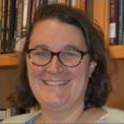
My excitement over teaching a new contemplative English course this year drew me to the teaching fellows program at the ICJS. I’m grateful for the opportunities to teach the course and to learn with the ICJS cohort. My course, called Wise Readings, invites students to find personal connections between each other and with the texts. Instead of focusing on being critics who respond to texts as antagonists, tearing them apart, as the public sphere so often invites us to do, in this new course, we read with the faith that our books hold wisdom for us, and that we can trust our own reactions to great literature. We take our cues from “Harry Potter and the Sacred Text,” a podcast that grew out of courses at Harvard Divinity School, treating our favorite books as though they are sacred, with lots to teach us about living well. Hopefully, this class invites us to examine our own lives deeply and helps to facilitate students’ deep connections with the readings and with each other.
We have practiced with secular adaptations of contemplative reading practices such as Lectio Divina, Hevruta, Sacred Imagination, Pardes, and Marginalia. Students have kept commonplace books as collections of their favorite quotes and favorite learning from the semester. They made screencasts showing their use of contemplative practices, wrote their own secular Rules of Life, reflected on how different contemplative practices supported their interactions with the readings and will end the semester writing either about their commonplace books or about a book that has changed their lives.
Two practices that my students are most familiar with at this point in the year are secular Lectio Divina and Hevruta. One teacher calls Lectio Divina “Read It Four Ways.” We begin in quiet. Students find a passage that seems to leap off the page at them and spend some time in silence, contemplating that very short passage. The approach, as modified by Vanessa Zoltan, a host of Harry Potter and the Sacred Text, invites us to ask, “What does the text literally say?,” and then, to explore the allegorical meanings available in the text, we ask, “What other texts does this remind me of?” Then, we invite the text into conversation with our own lives, asking and contemplating (in writing or not), “What does this text mean to me?” and “What does my experience contemplating this text makes me feel called to do?” My students seem to love Lectio, in part because this contemplative bit of their day stands at such a sharp contrast to the rest of it.
My students have also enjoyed Hevruta. Acknowledging that “two scholars sharpen each other” (Babylonian Talmud, Ta’anit 23a), students sit knee-to-knee, asking questions about a short text. TCI provides Jewish resources for independent schools: they’ve shared this handout on Hevruta, here. Zoltan’s approach is less involved, employing a pattern in which I ask a question about the shared text, and offer an answer to my own question; then my partner offers an answer to my question and then poses one of their own. The pattern continues to repeat, as we go deeper and deeper into the text.
There are many more approaches than just those two. I have compiled a fairly thick folder of resources about contemplative practices in the classroom, and am happy to share with anyone interested. As we move through the spring as teaching fellows, I hope we might talk about how and why to bring contemplative practices into the classroom, and particularly how to do that responsibly. I know that there is a movement in higher ed that focuses on bringing contemplative practices into the academy, and I’m interested in exploring resources about that movement, too.
Using contemplative practices helps me to invite students to bring their whole selves to the English class. I still have so much to learn about how to do this well, and I feel inadequate at it most days. But it feels meaningful and important, and perhaps most significantly, the kids seem to be really enjoying it.
 Helen Berkeley is an English Teacher and Chair of the English Department at Friends School of Baltimore. Berkeley was a member of the 2018-19 ICJS Teachers Fellowship.
Helen Berkeley is an English Teacher and Chair of the English Department at Friends School of Baltimore. Berkeley was a member of the 2018-19 ICJS Teachers Fellowship.
Opinions expressed in blog posts by the ICJS Teacher Fellows are solely the author’s. ICJS welcomes a diversity of opinions and perspectives.